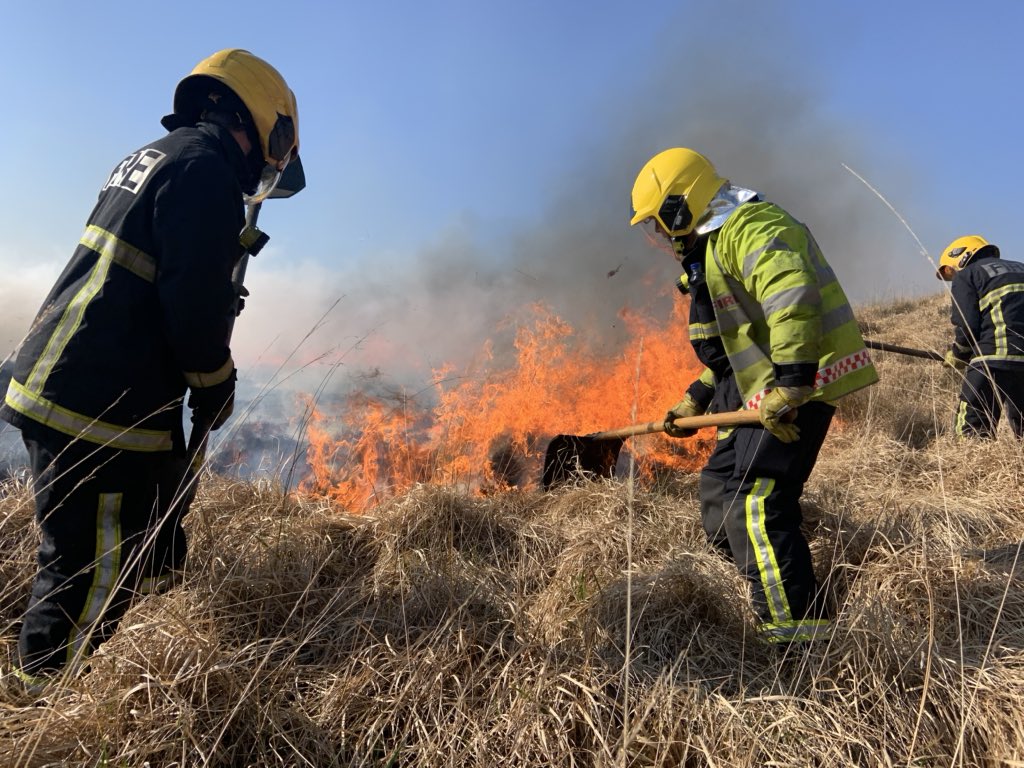As Covid-19 spreads across Ireland, gorse fires roar in tandem

March 30th, 2020
A number of illegal gorse fires have raged across the country over the past week, burning hectares of land, impacting numerous species and diverting vital emergency services away from their focus on the Covid-19 pandemic.
It is currently an offence under the Wildlife Act to burn any vegetation growing on any land not then cultivated from 1 March to 31 August as spring and summer are the prime seasons for nesting birds, breeding mammals and the regeneration of growth and habitats.
Traditionally, controlled burning of dry or dead vegetation such as gorse heather, hill grasses was carried out to encourage new growth for livestock grazing. However, burning has grown out of control in recent years.
The Government has made it clear that landowners risk prosecution, fines and potential imprisonment for such action, while land found to have been illegally burned is no longer eligible for subsidy payment.
Earlier this month, a Donegal pensioner was charged with arson causing €300,000 in criminal damage connected to a gorse fire in the county last Easter. The case is set to be heard in early May.
Yet, as in previous years, the message does not appear to have resonated with everyone and several gorse fires have blazed throughout the country over the past week.
This has caused damage to wildlife and diverted emergency services away from dealing with Covid-19 and also causing firefighters to risk infection by coming into close contact to battle blazes.

Killarney up in smoke
Last night, around 60 hectares of land was damaged by a fire in the Dinis area of Killarney National Park. The National Parks and Wildlife Service (NPWS) battled the fire through the night together with support from the Kenmare and Killarney fire services.
Kerry County Council said that the fire is “an unnecessary strain on resources at a time of national emergency” and is asking landowners to act more appropriately “at a time of national crisis”.
Earlier this morning, fire crews from Dundalk and Carlingford worked for three hours to put out a gorse fire on the Annaverna mountain in Co Louth.
In Cork, Bantry and Schull crews were called out last Thursday night to battle gorse fires near Bantry and Macroom. A future hill fire near Bantry burned from Friday night until the following morning as firefighters from Bantry, Skibbereen and Dunmanway battled to keep it under control.
“In light of the ongoing Covid-19 National Emergency, Cork County Fire Service wish to advise all landowners to cease and desist all controlled burning effective immediately,” Cork County Fire Service said in a Facebook post this morning.
On Friday evening, fire crews in Wicklow also battled a range of fires that broke out on the Sugarloaf that the Wicklow Fire Service said is “diverting firefighters and increasing the risk of infection” of Covid-19.
‘Cowboys lighting the fires’
The Bray service had already been called out to battle fires on the Sugarloaf and at the Glencap commons last Tuesday that the Wicklow Fire Service said was started due to “suspected illegal agricultural burning”.
This was followed by a fire at Ballinasloe Wood, above Lough Tay on Wednesday evening that was dealt with by the Greystones fire crew, with the Rathdrum service called into action yesterday afternoon to deal with “another illegal agricultural fire”.
Several fires had already broken out across the Wicklow Mountains earlier in the month, including at the Glencap Commons on 11 March and on the military road near Laragh on 22 March, leaving the county’s fire service less than impressed.
“In old films, smoke signals in the hills was always bad news, the only thing that’s changed is that it’s the cowboys who are lighting the fires now,” the Wicklow Fire Service tweeted earlier this month.
On Friday, firefighters from Rathfarnham fought a gorse fire in Glencullen, while 10 firefighters from Dun Laoghaire fought a gorse fire in Killiney earlier in the month.
The Minister for Agriculture Michael Creed has moved quickly to rebuke any landowners who may have engaged in burning activity that he said is depleting emergency service resources.
“Given the current emergency arising from the Covid-19 pandemic, it is more important than ever that no one should start an illegal fire in the countryside. Such activity will cause the unnecessary diversions of emergency service resources,” Mr Creed said.
“At any time but particularly in the current emergency, such disturbance to rural dwellers, including those who are old and vulnerable, cannot be permitted under any circumstances,” he said.
The NPWS confirmed that is will deploy electronic and other surveillance such as drones in the vicinity of national parks and reserves over the coming weeks.
Up in flames
There was a substantial flare up of gorse fires during during the summer heatwave in 2017 that had a devastating impact across the globe.
Based on an analysis of data from fire services between June and July 2017, The Green News revealed that firefighters attended to at least 2,257 bog, gorse, grass, and forest fires.
The fire services in Northern Ireland have responded to a further 1,972 fires, according to the Northern Ireland Fire & Rescue Service.
Dublin alone dealt with 648 incidents, while in Cork, 21 fire stations responded to 293 incidents, 161 of which were gorse fires, 115 grass and 17 related to incidents in forested areas.
This figure does not cover the perimeter area around Cork City which is covered by two stations in Ireland’s second city.
Limerick faced 179 incidents of vegetation fires. Earlier this month, a large gorse fire atop Nicker Hill raged for five hours before fire crews were able to get it under control.
Wicklow tackled 132 wildfires in June alone, with the county’s fire service expecting more before the end of the summer, particularly in the mountains. Several fires overwhelmed the mountainside in June, including two large bog fires near Lough Bray and in the Sally Gap.
Offaly dealt with 17 fires, including major fires in the Slieve Bloom Mountains and another in Barna. The fire in Slieve Bloom started close to an important blanket bog and a habitat for the endangered Hen Harrier.
[x_author title=”About the Author”]







